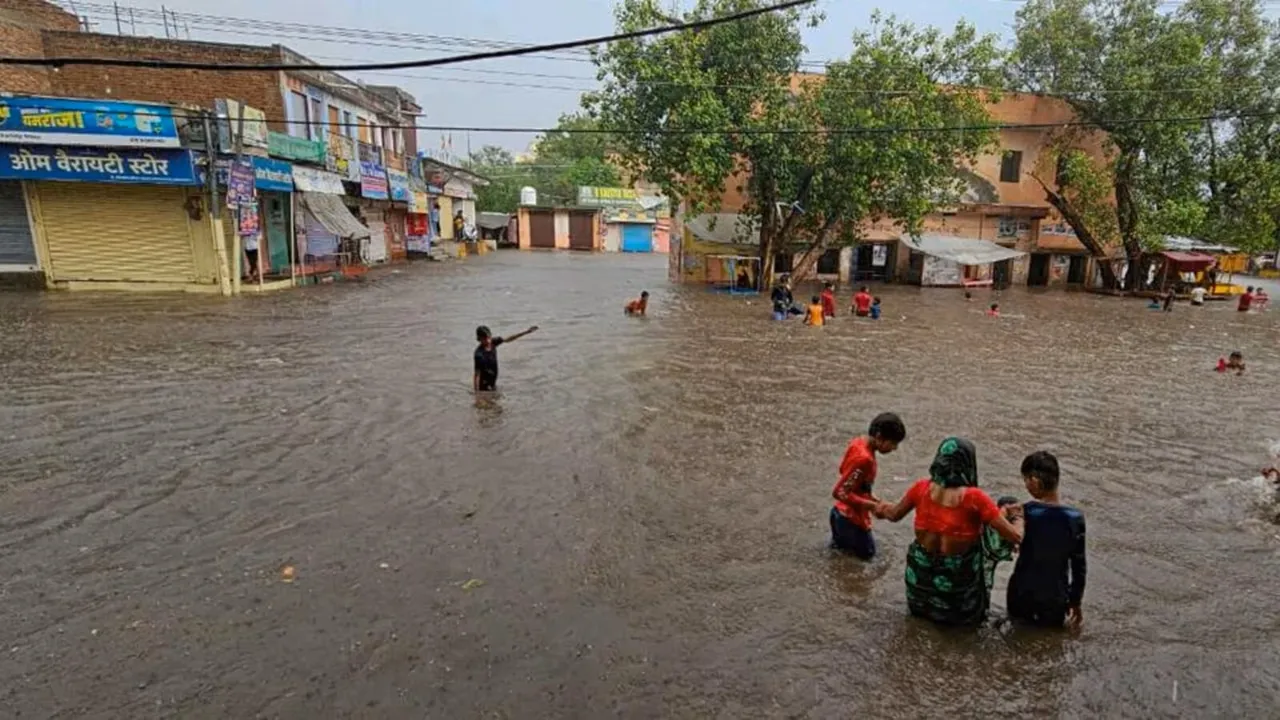

Daily life in Rajasthan is disrupted as a Western Disturbance brings rainfall and a dip in temperatures, with dense fog blanketing several areas. The India Meteorological Department (IMD) has issued an orange alert for 15 districts and a yellow alert for six, warning of persistent dense fog for the next three days. The adverse weather has caused travel difficulties and disrupted daily activities, with residents advised to stay updated on weather advisories and take precautions.
Winter Weather Wreaks Havoc in Rajasthan: Dense Fog and Rainfall Disrupt Daily Life
Background:
Rajasthan, a vast state in northwestern India, is known for its extreme weather conditions, characterized by hot summers and cold winters. During the winter months, the state experiences a phenomenon known as a "Western Disturbance," which is a weather system originating from the Mediterranean Sea that brings rainfall and a dip in temperatures to the region.
Current Situation:
As of January 10, 2023, a Western Disturbance has brought heavy rainfall and dense fog to Rajasthan, leading to widespread disruptions in daily life. The India Meteorological Department (IMD) has issued an orange alert for 15 districts and a yellow alert for six, warning of persistent dense fog for the next three days.
The fog has caused significant travel difficulties, with visibility reduced to near zero in several areas. Road, rail, and air traffic have been affected, leading to delays and cancellations. In addition, the cold weather has caused a spike in respiratory and cardiovascular ailments among the population.
Impact on Daily Life:
The adverse weather conditions have disrupted daily activities for residents of Rajasthan. Schools and colleges have been closed, and outdoor events have been postponed or canceled. Residents have been advised to stay updated on weather advisories and take precautions, such as wearing warm clothing and avoiding unnecessary travel during foggy conditions.
Top 5 FAQs:
1. What is a Western Disturbance?
A Western Disturbance is a weather system that originates from the Mediterranean Sea and brings rainfall and a dip in temperatures to northwestern India during the winter months.
2. Why is the fog so dense in Rajasthan?
The fog in Rajasthan is caused by a combination of factors, including low temperatures, high humidity, and the presence of pollutants in the atmosphere.
3. How long is the fog expected to last?
The IMD has issued alerts warning of persistent dense fog for the next three days. However, the duration and intensity of the fog may vary depending on the weather conditions.
4. What are the health risks associated with the fog?
Exposure to dense fog can aggravate respiratory and cardiovascular conditions, especially among vulnerable populations such as the elderly, children, and those with existing health problems.
5. What precautions should residents take during the foggy weather?
Residents are advised to stay updated on weather advisories, wear warm clothing, avoid unnecessary travel during foggy conditions, and seek medical attention if they experience any respiratory or cardiovascular symptoms.

The recent police raid in Brazil, which resulted in one of the deadliest operations in Rio's history, has sparked outrage and protests. Families of the victims claimed that their loved ones were executed by the police, while the government celebrates it as a win against crime. Shocking images of bodies lined up in the street have led to widespread protests and accusations of police brutality. However, official reports and videos of victims' bodies suggest that the deaths were not a result of armed conflict, raising questions about the excessive use of force by the police.

Four people have died and 11 have been injured after a UPS cargo plane crashed near Louisville Muhammad Ali International Airport in Kentucky. All flights in and out of the airport have been suspended as police and emergency services are attending the scene. Kentucky governor Andy Beshear has described the accident as "catastrophic" and is urging residents to obey any shelter-in-place orders.

Eight people have been killed and numerous others injured after a passenger train collided with a goods train in Chhattisgarh. The accident occurred in the afternoon, halting train services on the route and prompting the cancellation or diversion of multiple trains. Emergency teams have been dispatched to the scene, with rescue operations ongoing and medical treatment being provided to the injured passengers. Helpline numbers have been issued for convenience, and the railway authorities have assured that all efforts are being made to assist those affected by the tragedy.

Today, 5 November 2025, marks the 556th birth anniversary of Guru Nanak Dev Ji, the founder of Sikhism. As we celebrate this sacred and highly revered festival, let us remember and spread the teachings of Guru Nanak Dev Ji, which promote compassion, humility, and love for all. To commemorate this occasion, indianexpress.com has compiled heartfelt wishes and messages to share with friends and family, wishing everyone endless happiness, peace, and prosperity.

During the Emerging Science Technology and Innovation Conclave, PM Modi announced the launch of the Rs 1 lakh crore Research, Development and Innovation Fund. This fund, under the Department of Science and Technology, aims to encourage private sector investments in R&D to drive India's vision of becoming an innovation-driven nation. With this fund, India's R&D expenditure has doubled in the last decade and the country now has the world's third-largest startup ecosystem. PM Modi also highlighted how India's domestic capability has accelerated during the COVID-19 pandemic due to its successful digital public infrastructure.

A stampede at the Kasibugga Venkateswara Swamy Temple in Andhra Pradesh has left 10 dead and two injured. The temple had recently reopened and was experiencing high footfall due to a festival. Home Minister Vangalapudi Anitha has ordered a thorough investigation into the causes of the tragedy and has promised strict measures to prevent similar incidents in the future.

India and the United States have strengthened their already strong ties by signing a 10-year framework for their major defense partnership. The agreement, signed during a bilateral meeting between the two countries' defense ministers, emphasizes the importance of this partnership in maintaining a free and open Indo-Pacific region. This marks a significant step in solidifying the bond between India and the US in the defense sector.

In preparation for a major tri-service military drill, India has issued Notices to Airmen (NOTAM) for the entire northeastern region that borders China, Bhutan, Myanmar, and Bangladesh. The first set of exercises will commence in November and continue through January, signaling enhanced operational readiness for the Indian Air Force (IAF). This move is significant as the Northeast remains a sensitive theater, making up the boundary with four countries, including China. The upcoming IAF exercises aim to strengthen India's air dominance, effectively preparing for any potential challenges along the western frontier with Pakistan.

India will conduct a 10-day military exercise in Rajasthan and Gujarat involving the Army, Air Force, and Navy to showcase its operational readiness following Operation Sindoor earlier this year. The exercise, announced through a NOTAM, features advanced military technologies and emphasises the integration of speed, firepower, and precision in desert warfare conditions. It comes amidst heightened tensions with Pakistan and a renewed focus on maintaining military readiness along the border.

Jammu and Kashmir police have filed an FIR against a group of Christian missionaries in Kathua district for allegedly attempting religious conversions through financial incentives. This comes after a video surfaced online showing the missionaries being attacked and their vehicle vandalized by villagers. The incident has sparked outrage and protests from local Hindu groups, demanding action against the accused missionaries. One accused, Ravindra Singh Thela, has been arrested while the main accused, Vivek Soni, is still at large. The police have also suspended eight personnel for failing to stop the attack.